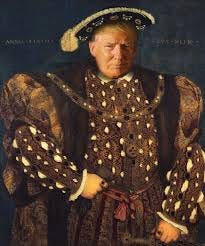The President “may adjourn Congress to such time as he shall think proper”
If someone tells you “Mein Kampf” is a favorite book, don’t smile dismissively.
Critical Remembering Theory, 05052025: We live in a peculiar time frequently characterized by the phrase, “A President has never done this before.” In such times, it is worth remembering other occasions of such peculiarity.
The November 1932 German election gave Hitler’s Nazi Party 33% of the Reichstag (Parliament). Though unable to form alliances to allow Hitler to claim the Chancellorship of Germany outright, Hitler pressured President Hindenburg to declare him Chancellor because his party had the largest percentage by far in the Reichstag. Initially resisting, Hindenburg finally relented and acknowledged Hitler as Chancellor on January 30, 1933. Hitler immediately called for the dissolution of the Reichstag and for new elections to be held on March 5, 1933. Hitler hoped to win a clear majority in the Reichstag.
On February 27, the Reichstag building burned to the ground. Through the Nazi propaganda system, this “arson” was blamed on the communists and became a rallying cry for supporting the Nazi Party and Hitler in the coming election. Hitler, still Chancellor, forced Hindenburg to use his presidential emergency powers to enact the Reichstag Fire Decree that suspended most civil rights, including free speech, free press, right to assemble for protest, and due process.
Leading to the March 5 election, the Nazis used extreme voter intimidation by the Nazi Party militia, the SA (Sturmabteilung, aka brownshirts), and secret liaisons with other political and economic leaders to direct the voting. Hitler was able to win 44% of the Reichstag. While a disappointment, for he wanted to win a clear majority, an additional 8% from a coalition partner, the German National People’s Party, allowed Hitler and the Nazis to control the Reichstag.
On March 22, 1933, at Potsdam, Hitler convinced (cue the SA again) the Reichstag members to pass the Enabling Act of 1933, which dissolved the Reichstag indefinitely and gave Hitler absolute power over Germany.
On August 2, 1934, Hindenburg died. Hitler and his governing council announced that the office of President and Chancellor would be combined, and Hitler became “Der Führer”—The Leader. With this action, Hitler took absolute control of Germany as a unitary executive. Der Führer operated with complete authoritarian power, with no exceptions, demanding loyalty, and allowing for no disagreements.
The key to this takeover of Germany was the Enabling Act of 1933. Beguiled, bewitched, or, more likely, beheaded, members of the Reichstag (of whom some dissenters mysteriously disappeared or died before the vote) voted to end their role in governing Germany by adjourning the Reichstag until Hitler called them back into session.
What does this have to do with anything?
One might dismiss all this history and say, “It could never happen here.” But wait, due process is under assault, free speech is being challenged around the country, the press is being hammered, freedom of assembly is being looked at harshly, and non-conforming institutions are being attacked and bullied. The Brownshirts (ICE) are moving menacingly around the country. But what about Congress? Surely, they are the failsafe for all of this. According to the Federalist Papers (FP), you would think so. The late 18th-century writers of the FP, advocating intensely on behalf of the ratification of the Constitution, made it clear that the allegiances of those elected to Congress would be to the Constitution and not to the occupant of the Presidency. If a president began to act contrary to the interests of “We the people”, Congress would act and, through their various legislative powers and oversight, would prevent the President from taking on the airs of a monarch. The FP assured us we would be safe as long as Congress was in session. Alas, the congressional safety net is not working so well. What about this “in session” matter?
“In session”
According to Article 1, Section 5, Clause 4 of the Constitution, “Neither House, during the Session of Congress, shall, without the Consent of the other, adjourn for more than three days, nor to any other Place than that in which the two Houses shall be sitting.” As far as the constitutional instructions on adjournment, this is it. However, does a dark cloud loom in Article 2?
Article 2, Section 3, Duties of the President: “He shall from time to time give to the Congress Information of the State of the Union, and…, and in Case of Disagreement between them (the Senate and the House), with Respect to the Time of Adjournment, he may adjourn them (Congress) to such Time as he shall think proper; …”.
The consensus of many annotated commentaries on the Constitution is that no historical record of any president executing this portion of Article 2, Section 3 exists. Consequently, there is very little critical analysis of this “duty.”[i] Currently, the US Congress is AWOL. In 100+ days, only five pieces of legislation have been sent to the President’s desk for signing. One passed before he was sworn in, and two were continuing resolutions on budget matters. The Republican Congress has passed nearly zero resolutions and said virtually nothing to object to the many, many egregious and constitutionally questionable actions of DJT. Of course, DJT is okay with this as he governs as a unitary executive by Executive Orders anyway. He does not need Congress. But what would happen if Congress suddenly became an irritant to DJT? With assisting conspirators in Congress, could the President manufacture a “disagreement” about adjournment?
What would this be? How would it happen? We don’t know. “A president has never done this before.”
What if the House wants to adjourn for seven days? It must have the Senate’s approval. What if the Senate says “NO.” The House gets pissy (one of Mike Johnson’s most precious behaviors) and heads out anyway. The Senate calls on its Sergeant-at-Arms to round up all the members of the House and bring them back to solve this “disagreement.” The issue becomes heated, and “BOOM!” the President adjourns Congress until whatever date he chooses.
Could this work? What would happen? We don’t know. “A president has never done this before.”
We have a president who delights in doing what has never been done before. Except it has been done before (see above).
If you are last to leave, please turn out the lights.
[i] An article from the University of Minnesota Law School, published in the University of Illinois Law Review, provides an argument against this adjournment power limited to the scenario of a president trying to adjourn the Senate in order to avoid the Senate stalling confirmations of presidential appointments,
https://papers.ssrn.com/sol3/papers.cfm?abstract_id=5043238
The Heritage Foundation offers an article contradicting the Minnesota argument.





